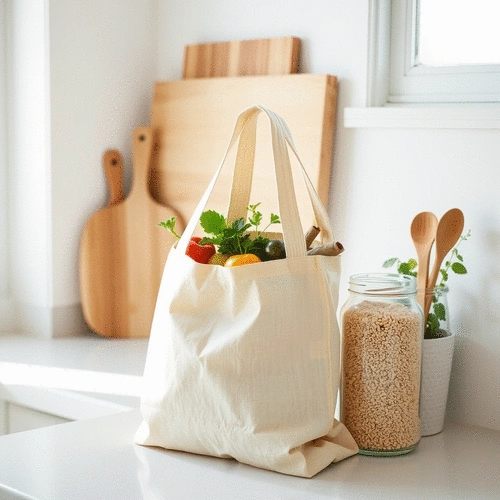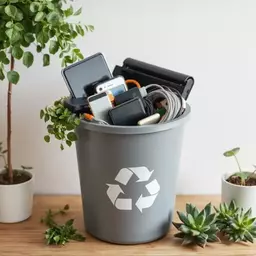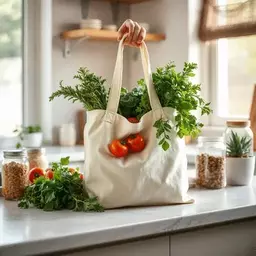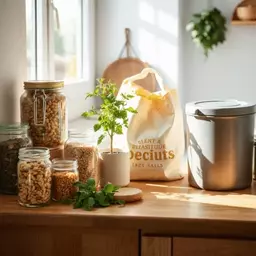Did you know that adopting a low-waste lifestyle can significantly reduce your carbon footprint while saving you money? As we face an escalating waste crisis, making conscious choices in our daily lives can lead to a healthier planet for future generations. Let's explore actionable steps you can take today!
What You Will Learn
- The importance of a low-waste lifestyle in combating environmental issues and setting a positive example for others.
- Simple daily actions, such as using reusable containers and mindful shopping, that can drastically reduce waste.
- How composting can transform organic waste into nutrient-rich soil and its role in sustainable living.
- The benefits of reducing single-use items and engaging with local farmers and community resources for sustainable habits.
- Strategies to overcome common challenges in adopting low-waste habits and the importance of gradual progress.
- Resources and next steps for finding local support, including waste tracking apps and community groups focused on sustainable practices.
- Eco-friendly transportation options that can further reduce your carbon footprint while promoting a healthier lifestyle.
Benefits of a Low-Waste Lifestyle
Adopting a low-waste lifestyle not only helps the environment but also provides several personal benefits. Below is a breakdown of the key advantages.
Environmental Impact
Each item you reuse or recycle contributes to reducing your carbon footprint.
Cost Savings
Lower waste typically means reduced costs for trash disposal and buying less often results in more savings.
Community Engagement
Joining local sustainability initiatives can enhance your experience and provide support.
Mindful Consumption
Every purchase becomes an opportunity to support eco-friendly brands and sustainable practices.
Immediate Low-Waste Lifestyle Changes for Sustainable Living
Making changes to embrace a low-waste lifestyle can be incredibly rewarding! At Eco Habits Daily, we believe that even the smallest adjustments in our daily routines can lead to a healthier planet. By understanding the importance of reducing waste, we take a significant step towards sustainable living.
Understanding the Importance of a Low-Waste Lifestyle
Low-waste living is all about reducing the amount of waste we produce in our daily lives. It’s crucial because our planet is facing a waste crisis, with landfills overflowing and natural resources depleting. When we choose to live with less waste, we’re not just helping the environment; we’re also setting an example for others and contributing to a healthier future!
When we embrace a low-waste lifestyle, we significantly cut our carbon footprints. This is achieved by minimizing single-use plastics, reducing food waste, and making mindful purchasing decisions. The more we educate ourselves about our consumption habits, the more empowered we become to make positive changes.
- Reduces landfill waste: Less waste in landfills means fewer environmental problems.
- Conserves resources: Living with less encourages mindful consumption.
- Saves money: Reducing waste often leads to lower spending on unnecessary items.
Daily Actions to Reduce Waste Today
There are several simple actions we can take each day to start reducing waste. By incorporating these practices, we can all contribute to a more sustainable world! Let’s explore some of these impactful changes that we can make.
Embrace Reusable Containers in Your Routine
One of the easiest ways to reduce waste is by using reusable containers. Whether it’s shopping bags, water bottles, or lunch containers, swapping disposable items for reusable ones makes a huge difference. I always carry a reusable tote bag in my car for unexpected grocery trips!
- Use reusable shopping bags instead of plastic bags.
- Opt for a stainless-steel water bottle to stay hydrated.
- Pack your lunch in a Bento box to avoid single-use packaging.
Start with one or two reusable items and gradually expand your collection. It’s a simple yet effective way to incorporate sustainability into your daily routine!
Mindful Shopping: Choosing Secondhand and Bulk Options
When it comes to shopping, being mindful can significantly cut down waste. Try exploring thrift shops for unique finds or purchasing in bulk to reduce packaging waste. Not only is it environmentally friendly, but it can also be a fun treasure hunt!
- Visit local thrift stores to find gently-used clothing and household items.
- Buy bulk food items to minimize packaging waste.
- Look for products from sustainable brands that prioritize eco-friendly materials.
Mindful shopping not only reduces waste but also supports local communities and encourages sustainable practices.
Understanding Eco-Conscious Brands and Products
Choosing eco-friendly products is a powerful way to support sustainable living. When we purchase from brands that prioritize sustainability, we send a message about the kind of world we want to see. I love discovering products made from recycled materials or that come in compostable packaging!
- Research brands that use recycled or organic materials.
- Support companies that offer refillable packaging options.
- Look for certifications like Fair Trade or Carbon Neutral.
Every purchase is an opportunity to vote for the planet and support businesses that are making a difference.
Composting: A Simple Step Towards Sustainability
Have you ever considered composting? It's one of the best ways to reduce organic waste and improve soil health! Composting is easy to start and can make a significant impact on your waste output.
How to Start Composting in Your Home
Starting a composting routine can be as simple as setting up a bin in your kitchen or backyard. Here’s a straightforward approach to get you going:
- Choose a compost bin or container that fits your space.
- Add kitchen scraps like fruit peels, coffee grounds, and eggshells.
- Include yard waste like leaves and grass clippings.
- Mix everything up and keep it moist, turning it occasionally.
Before you know it, you’ll have nutrient-rich compost to enrich your garden soil!
Compost Bin Innovations: Choosing the Right Tools
Today, there are many innovations in composting tools that can make the process even easier. From smart compost bins that help track your waste to compostable packaging options, the choices are expanding!
- Look for smart compost bins that monitor the composting process.
- Consider compostable bags for easy disposal of food scraps.
- Explore indoor composting setups for limited spaces.
These tools can simplify composting and make it more accessible for everyone!
Eco-Friendly Habits to Adopt Now
Adopting eco-friendly habits doesn’t have to be overwhelming. With small changes, we can all move toward a more sustainable lifestyle. Here are some practical tips you can start using immediately!
Reducing Single-Use Items in Your Daily Life
Single-use items are everywhere, but we can make choices to minimize their use. Start by identifying a few items you can replace with reusable alternatives. For instance, instead of using plastic cutlery, carry a reusable set!
- Swap plastic straws for metal or bamboo straws.
- Use a reusable coffee cup at your favorite café.
- Bring your own containers for takeout meals.
Every little change adds up, making a significant difference in our waste output!
Engaging with Local Farmers and Community Resources
Connecting with local farmers and community resources can enhance your low-waste journey. Farmers’ markets offer a chance to buy fresh produce while reducing packaging waste. Plus, supporting local businesses strengthens your community!
- Visit your local farmers’ market for seasonal produce.
- Join community gardening groups to learn about sustainable practices.
- Participate in local clean-up events to engage with like-minded individuals.
These connections can inspire and motivate you on your sustainability journey!
Emphasizing Water Conservation and Food Waste Reduction
Water is a precious resource, and conserving it should be a priority. Additionally, reducing food waste can further contribute to our sustainability efforts. Here are some strategies to consider:
- Collect rainwater for gardening and outdoor use.
- Plan meals to minimize leftovers and use up perishable items.
- Implement portion control to reduce food waste.
By adopting these practices, we can collectively make a positive impact on our planet!
Understanding the Benefits of a Low-Waste Lifestyle
Living a low-waste lifestyle is not just about reducing garbage; it brings many benefits! From saving money to creating a healthier environment, the advantages are numerous.
Environmental Impact and Cost Savings
One of the most significant benefits of low-waste living is its impact on the environment. Every item you reuse or recycle contributes to reducing your carbon footprint. Plus, you might be surprised at how much money you can save!
- Lower waste typically means lower costs for trash disposal.
- Buying less often translates to more savings.
- Investing in quality, reusable items pays off in the long run.
By adopting a low-waste lifestyle, you’re not just helping the planet but also your wallet!
Community Involvement: Building a Sustainable Network
Getting involved in local sustainability initiatives can enhance your experience. By joining forces with others, we can share knowledge, resources, and support. Plus, it’s more fun working towards a common goal!
- Attend local workshops on sustainable living.
- Join environmental advocacy groups.
- Share your low-waste journey on social media to inspire others.
Building a community around sustainability not only helps us learn from one another but also amplifies our impact!
Pro Tip
Did you know that by using just one reusable item can prevent an average of 167 plastic bags from entering landfills each year? Start simple—carry a reusable shopping bag or a stainless-steel water bottle to make a significant impact on reducing waste. Every small change contributes to a healthier planet!
Summarizing Your Journey Toward a Low-Waste Lifestyle
Addressing Common Challenges in Adopting Low-Waste Habits
Adopting a low-waste lifestyle is rewarding but can come with challenges. Many people face hurdles such as limited access to bulk stores or the difficulty of finding space for composting. It’s important to remember you’re not alone in this journey, and there are solutions!
Here are a few strategies to help you overcome common obstacles:
- Explore Online Options: If local bulk stores are scarce, consider shopping online at stores that specialize in eco-friendly products.
- Get Creative with Composting: No yard? No problem! You can start with a countertop compost bin or even use a worm composter.
- Connect with Others: Joining local community groups can provide resources and information on where to shop or compost effectively.
Facing these challenges is part of the growth process! Remember, every small step counts towards a more sustainable future.
Encouraging Gradual Progress and Continuous Learning
Transitioning to a low-waste lifestyle doesn’t have to happen overnight. It’s all about gradual progress and continuous learning. You can make changes at a pace that feels comfortable to you.
Here are some practical tips to help you integrate low-waste habits without feeling overwhelmed:
- Start Small: Begin with one change per week, like swapping out a plastic bag for a reusable one.
- Set Realistic Goals: Instead of aiming for perfection, focus on what you can realistically achieve.
- Keep Learning: Follow blogs and social media accounts that inspire you. At Eco Habits Daily, we’re here to provide ongoing support with fresh ideas!
Remember, it’s okay to make mistakes along the way. The key is to keep moving forward and embrace the learning journey!
Taking Action: Resources and Next Steps
Finding Local Resources for Sustainable Living
Finding the right resources is crucial for maintaining your low-waste lifestyle. Luckily, there are many tools available to help you along the way!
Start by looking for:
- Waste Tracking Apps: These can help you monitor your waste and set goals.
- Local Bulk Stores: Check out online directories or community boards to find stores near you.
- Zero-Waste Groups: Engaging with local organizations dedicated to sustainable practices can lead to valuable connections.
These resources can make your journey easier and more effective! Always keep an eye out for new opportunities to learn and grow.
Connecting with Like-Minded Individuals and Communities
Building a support system is essential when adopting eco-friendly habits. Connecting with others who share your passion for sustainability can be incredibly motivating!
To find your community, consider:
- Local Meetups: Join eco-conscious groups in your area to share experiences and ideas.
- Social Media Groups: Platforms like Facebook and Instagram have vibrant communities discussing low-waste living.
- Volunteer Opportunities: Getting involved in local sustainability initiatives can help you meet like-minded individuals while making a difference.
Building these connections fosters not only your personal growth but also a stronger community focused on sustainable living.
Exploring Sustainable Transportation Options
Transportation plays a significant role in our ecological footprint, so it's vital to consider eco-friendly options. There are many ways to reduce your carbon footprint while getting from point A to point B!
Here are a few sustainable transportation options to explore:
- Walking or Biking: These are not only good for the planet but also great for your health!
- Public Transportation: Buses, trains, and trams can significantly reduce the number of cars on the road.
- Carpooling: Sharing rides reduces emissions and can save you money on gas!
By making mindful transportation choices, you’re contributing to a healthier planet. Every step counts toward a more sustainable lifestyle!
Frequently Asked Questions About a Low-Waste Lifestyle
Below are some common questions about adopting a low-waste lifestyle:
- What is a low-waste lifestyle?
- A low-waste lifestyle focuses on reducing the amount of waste produced in daily life. This involves minimizing single-use items, recycling, composting, and making mindful consumption choices to lessen environmental impact.
- What are the main benefits of adopting a low-waste lifestyle?
- The main benefits include reducing your carbon footprint, conserving natural resources, saving money through reduced consumption and disposal costs, and fostering community engagement in sustainable practices.
- How can I start reducing waste immediately?
- You can start by embracing reusable containers (bags, water bottles, lunch boxes), practicing mindful shopping (secondhand and bulk options), and supporting eco-conscious brands. Composting organic waste is also an excellent immediate step.
- Is composting difficult to start at home?
- No, composting is relatively simple. You can begin with a small bin for kitchen scraps and yard waste, keeping it moist and turning it occasionally. Many modern compost bins and tools can simplify the process further.
- What are some common challenges in adopting low-waste habits, and how can I overcome them?
- Common challenges include limited access to bulk stores or space for composting. Overcome these by exploring online eco-friendly shops, trying countertop or worm composters, and connecting with local zero-waste groups for resources and support.
Recap of Key Points
Here is a quick recap of the important points discussed in the article:
- Embrace a low-waste lifestyle to reduce landfill waste, conserve resources, and save money.
- Incorporate reusable containers into your routine, such as shopping bags, water bottles, and lunch boxes.
- Practice mindful shopping by choosing secondhand items and bulk purchases to minimize packaging waste.
- Support eco-conscious brands that prioritize sustainable materials and practices.
- Start composting to reduce organic waste and improve soil health; consider using innovative composting tools.
- Engage with local farmers and community resources to enhance your low-waste journey.
- Adopt eco-friendly habits gradually, focusing on small changes that fit your lifestyle.
- Connect with local communities and resources for ongoing support and shared learning experiences.










